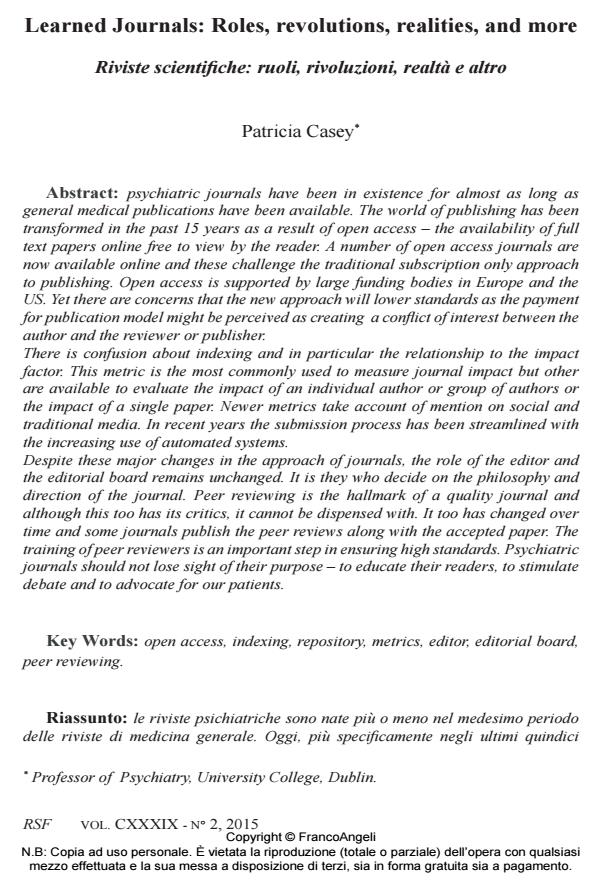Learned Journals: Roles, revolutions, realities, and more
Titolo Rivista RIVISTA SPERIMENTALE DI FRENIATRIA
Autori/Curatori Patricia Casey
Anno di pubblicazione 2015 Fascicolo 2015/2
Lingua Italiano Numero pagine 16 P. 183-198 Dimensione file 154 KB
DOI 10.3280/RSF2015-002012
Il DOI è il codice a barre della proprietà intellettuale: per saperne di più
clicca qui
Qui sotto puoi vedere in anteprima la prima pagina di questo articolo.
Se questo articolo ti interessa, lo puoi acquistare (e scaricare in formato pdf) seguendo le facili indicazioni per acquistare il download credit. Acquista Download Credits per scaricare questo Articolo in formato PDF

FrancoAngeli è membro della Publishers International Linking Association, Inc (PILA)associazione indipendente e non profit per facilitare (attraverso i servizi tecnologici implementati da CrossRef.org) l’accesso degli studiosi ai contenuti digitali nelle pubblicazioni professionali e scientifiche
Psychiatric journals have been in existence for almost as long as general medical publications have been available. The world of publishing has been transformed in the past 15 years as a result of open access - the availability of full text papers online free to view by the reader. A number of open access journals are now available online and these challenge the traditional subscription only approach to publishing. Open access is supported by large funding bodies in Europe and the US. Yet there are concerns that the new approach will lower standards as the payment for publication model might be perceived as creating a conflict of interest between the author and the reviewer or publisher. There is confusion about indexing and in particular the relationship to the impact factor. This metric is the most commonly used to measure journal impact but other are available to evaluate the impact of an individual author or group of authors or the impact of a single paper. Newer metrics take account of mention on social and traditional media. In recent years the submission process has been streamlined with the increasing use of automated systems. Despite these major changes in the approach of journals, the role of the editor and the editorial board remains unchanged. It is they who decide on the philosophy and direction of the journal. Peer reviewing is the hallmark of a quality journal and although this too has its critics, it cannot be dispensed with. It too has changed over time and some journals publish the peer reviews along with the accepted paper. The training of peer reviewers is an important step in ensuring high standards. Psychiatric journals should not lose sight of their purpose - to educate their readers, to stimulate debate and to advocate for our patients.
Parole chiave:Libero accesso, indicizzazione, repository (archivi web), metriche, redattore, comitato di redazione, revisione paritaria
- [2] Tyrer P, Craddock N. The bicentennial volume of the British Journal of Psychiatry: the winding pathway of mental science. British Journal of Psychiatry 2012; 200,1: 1192.
- [1] Vandenbroucke JP. Medical Journals and the shaping of medical knowledge. Lancet 1998; 352: 2001-2006.
- [3] Fox T. Crisis in communication: the functions and future of medical journals. London: Athlone Press; 1965.
- [4] Bracken P, Thomas P. Postpsychiatry: a new direction for mental health. British Medical Journal 2001; 322(7288):724-727.
- [5] Galatzer-Levy IR, Bryant RA. 636,120 Ways to Have Posttraumatic Stress Disorder. Perspectives on Psychological Science 2013; 8,6: 651-62.
- [6] Frances A. Whither DSM-V? British Journal of Psychiatry 2009; 195: 391-92.
- [7] Psychiatry divided as mental health “bible” denounced. New Scientist 2013. 30th May by Coghlan A and Reardon S.
- [8] Pimm J. Open access publishing – a quiet revolution. BJ Psych Bulletin 2014; 38 (1) 1-2; DOI: 10.1192/pb.bp.114.04681
- [9] Budapest Open Access Initiative 2002. http://www.budapestopenaccessinitiative. org/read
- [10] Feng P. web.stanford.edu/group/journal/cgi.../Feng_SpecFeature_2004.
- [11] Doherty AM, Kelly BD. When Irish eyes are smiling: income and happiness in Ireland, 2003-2009. Irish Journal of Medical Science 2013; 182,1: 113-9.
- [12] Abbasi K. The debate around open-access publishing. Journal of the Royal Society of Medicine 2012; 105,5:185.
- [13] Gilbert N. Editor will quit over hoax paper. Nature 2009; DOI: 10.1038/news.2009.571.edit
- [14] Gargouri Y, Hajjem C, Lariviere V, Gingras Y, Brody T, Carr L, Harnad S. Self-Selected or Mandated, Open Access Increases Citation Impact for Higher Quality Research”. PLoS 2010. ONE 5 (10): e13636.arXiv:1001.0361v2. DOI: 10.1371/journal.pone.0013636
- [15] Davis PM. Open access, readership, citations: a randomized controlled trial of scientific journal publishing. The FASEB Journal 2011; 25 (7): 2129-34. DOI: 10.1096/fj.11-183988.PMID21450907
- [16] Björk BC, Solomon D. Open access versus subscription journals: A comparison of scientific impact. BMC Medicine 2012; 10:73. DOI: 10.1186/1741-7015-10-73.PMC3398850.PMID22805105.Edit[17]GerfieldE.Citationanalysisasatoolinjournalevaluation.Science1972;.178:471-9
- [18] Beall J. Article-Level Metrics: An Ill-Conceived and Meretricious Idea, http://scholarlyoa.com/2013/08/01/article-level-metrics/
- [19] Smith R. Peer review: Reform or Revolution. British Medical Journal 1997; 315: 759.
- [20] Godlee F, Gale CR, Martyn CN. Effect on the quality of peer review of blinding reviewers and asking them to sign their reports. A randomised controlled trial. Journal of the American Medical Association 1998; 280: 237 -240.
- [21] van Rooyen S, Godlee F, Evans S, et al. Effect of open peer review on quality of reviews and on reviewers’ recommendations: a randomised trial. British Medical Journal 1999; 318: 23 -27.
- [22] Walsh E, Rooney M, Appleby L, Wilkinson G. Open peer review: a randomized controlled trial. British Journal of Psychiatry 2000; 176,1:47-51.
- [23] Halder N, Ramsay R, Tyrer P, Casey P. Peer reviewing made easy. Advances in Psychiatric Treatment 2011; 17: 150-15.
Patricia Casey, Learned Journals: Roles, revolutions, realities, and more in "RIVISTA SPERIMENTALE DI FRENIATRIA" 2/2015, pp 183-198, DOI: 10.3280/RSF2015-002012